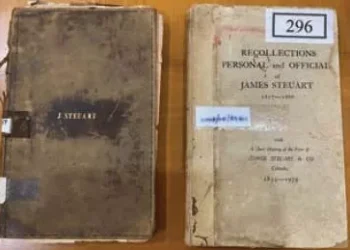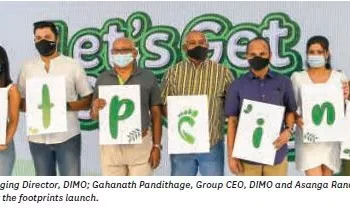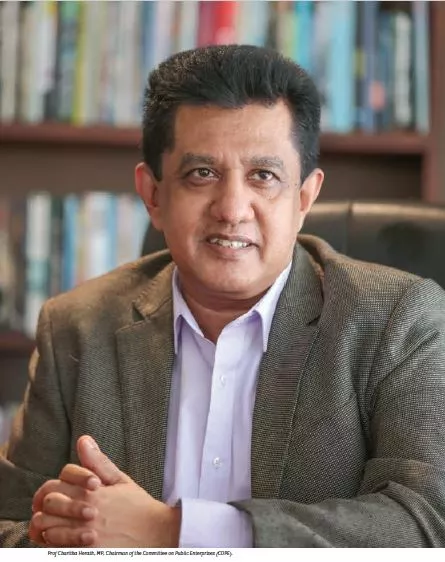
Prof Charitha Herath, an academic by profession, and serving as Member of Parliament has had a long history of engagement with public service, first as chairperson, Central Environmental Authority and later as secretary, Ministry of Mass Media and Information. Currently, he is the Chairman of the Committee on Public Enterprises (COPE). The Chairman outlined the authority and the mandate of COPE, while being buoyant about its commitment to play its role fairly and squarely under his leadership to hold public entities accountable to the people of this country, whose money has been entrusted with them under the watchful eye of the parliament.
By Udeshi Amarasinghe. Assisted by Jennifer Paldano Goonewardene.
Photography Menaka Aravinda.
As the Chairman of COPE can you tell us the work that is being done?
COPE is an important parliamentary working committee. Since we still follow the British system of governance, committees and sub-committees are an important core in a parliamentary democracy, which we have inherited from the British. The argument is that the country belongs to the people and hence the people have a right to control and overlook public finances. And it further says that the people have the sole authority to make legislations for the country. Therefore, the job of parliamentarians comprises several responsibilities. They make laws on behalf of the people while taking care of public finances as well. Since people are the main stakeholders of ‘the republic’ and parliamentarians are people’s ‘representatives,’ they (MP’s) should act on behalf of the people. The beginning of every public corporation was based on the people’s mandate, hence, at the end of the day, the premise is that it’s the people’s money that is used to run public corporations. Therefore, the rationale of the parliamentary over sight committees such as COPE is that the people of a country have the right to crosscheck, overlook, oversight and examine how these institutions are governed. And to see, how these public entities manage their finances, the gains and losses, corruption or misappropriation of finances that may be taking place in their decision making process. Committees like COPE can make recommendations to Parliament regarding the actions and decisions, which have been taken by the boards of those public enterprises. COPE activities can be interpreted as one of the main intervention of the Parliament on behalf of the people. This is the mandate given to COPE.
There are around 450 public entities (in the COPE reviewing list) in Sri Lanka. Some of these public enterprises can be called ‘attractive’ business, such as petroleum products, banking, media and retail. Out of the 450, there are around 150 public entities that make profits. In terms of public finance in this country, these profitmaking businesses are very important. Out of whole list of institutions, nearly another 150 institutions, which are not making such good profits and not showing such ‘attractive nature in their business’ yet, are still very important to the country. Some of the businesses in this category are CEB, Transport Board, and SriLankan Airlines. And, nearly another 150 public entities that are neither important nor do they make any profits. All these three types of institutions come under the purview of the COPE as public enterprises.
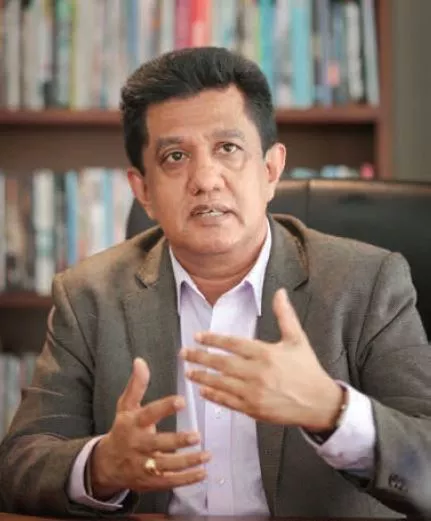
As a sub-committee, we have been mandated by the Parliament to examine the reports of the Auditor General. The Auditor General’s Department is engaged with all these government institutions to develop audit reports. There are two committees in Parliament; one is Committee on Public Enterprises or COPE and the other is the Committee on Public Accounts or COPA, which examines only public departments and ministries. On the other hand, COPE examines profit aiming entities, which are mainly public corporations. Hence, All the Boards, Corporations, Authorities and State institutions that come under the Company Act of 2009 come under our purview. By the Standing Order 120, it mentions as follows. “It shall be the duty of the Committee on Public Enterprises to examine the accounts of public corporations, institutions funded wholly or in part by Government and of any business or other undertaking vested under any written law in the Government laid before Parliament, with the assistance of the Auditor-General”. Members of the COPE have been selected from Both Government and opposition MP’s of the House. There is a standing order that stipulates that the number of members would be decided by members of an incumbent Parliament. At this ninth Parliament, we have 22 members in the COPE committee, who represent different political parties. The major component of COPE comprises Government MPs.
My name was proposed with the blessing of both the Government and the opposition members of Parliament, but initially there was a debate as to whether a member from the opposition should be given its chairpersonship. I am the 15th Chairperson of COPE. The first chairperson was appointed in 1979 with the enactment of the new constitution; out of the 15, ten chairpersons had been elected from the (then) ruling parties, while five had been from opposition political parties. Chairpersons from Government as well as from opposition political parties in Parliament have performed well in their positions in certain situations, while there have been chairpersons from the governing party as well as from opposition political parties who have not performed well in their posts in certain situations.
The ninth Parliament has so far in the first quarter examined six main institutions and COPE is at the point of releasing the first quarterly report to Parliament shortly. Some of the institutions that we have examined so far include very critical and sensitive entities, such as the Central Highway Project, which is long overdue and has been mired in many issues. The project commenced in 2009 and is still continuing, and although part of the highway from Mirigama to Kurunegala has been constructed, the rest has been left untouched. We have also had an interesting dialogue on ICTA and on financing communication technology in government institutions and the benefits and losses of such initiatives. We have identified many projects that had been initiated by some institutions, which remain incomplete. We have also examined the National Lotteries Board; also discussed about projects causing environmental pollution and water management issues, especially water management issues related with the Kelani River, which is the main source that provides drinking water to the residents of the Colombo Municipal Council, which makes it vital for this water resource to be safeguarded and kept clean, because the consumption in Colombo is colossal. We have examined the measures that had been taken thus far and identified the lapses. We have identified the factories in two industrial zones located in close proximity to the Kelani River, Biyagama and Seethawaka, dumping waste into the river. We have raised questions in this regard and proposed for a standing committee comprising of three ministries in order to safeguard the water in the Kelani River. Suggestions in this regard have been made already.
You spoke about making proposals, but have there been any practical outcomes from COPE reports and proposals?
Of course. If financial irregularities have been happening in a public entity, we have the mandate and the power to instruct the chief accounting officer of that particular ministry to take action. The chief accounting officer is also the secretary of a ministry. A secretary is empowered by a separate letter of appointment from the Treasury to function as the chief accounting officer of that ministry. What COPE does is to first identify and examine the issue with the assistance of the Auditor General’s Department before coming out with recommendations. We first recommend by instructing the chief accounting officer to do a complete and substantial inquiry. Second, if an officer or an individual has been allegedly involved in carrying out an illegal activity, but is not in the system right now; for instance, an officer who had served in a previous administration had taken a particular decision, which subsequently cost millions to the entity and left, could be identified and legal proceedings initiated against such an individual. And we have done so on several instances, where we have instructed the chief accounting officer to go ahead with initiating legal proceedings against such individuals. In such instances, they have to seek the opinion of the Attorney General’s Department. In cases where a person is continuing to hold office, we instruct the chief accounting officer to discuss with the minister on the relevant action to be taken in order to remove such individuals from office. We have in our capacity made submissions and introduced tools.
We bring all these issues back to the House (Parliament), where they are taken up again to decide whether to hold a special debate on the issue or pass a special communique or regulation. COPE members don’t have judiciary powers, such powers rests solely with the courts. What we can do is to instruct the chief accounting officer, who is obliged to follow our instructions as he is bound by the rules of public office. We can, at the same time, go before Parliament to table a report, after which Parliament can appoint a special commission or committee or initiate a debate on a matter. COPE members deal directly with the chief accounting officer while reporting back to the Parliament.
Would you say that COPE is effective?
Yes, COPE is very effective since the country has a huge engagement with the public sector. There are countries that don’t have very many public entities, but only regulatory bodies, but in Sri Lanka the Government is part of various businesses, such as, in retail, in transport, in telecommunications, and in media. The state manages two television stations and print media, the Government is also in finance and banking, with two big banks and four other smaller banks; the Government is in telecommunication, SLT being the main telecommunication provider to the country, while Mobitel, a leading mobile service provider also come under our purview; we also regulate the Ceylon Petroleum Corporation; providing power being a big public engagement and a big business, we also look into the functioning of the Ceylon Electricity Board, which is solely a state entity. SriLankan Airlines is also under the scope of COPE. Therefore, COPE is an effective and a much required entity. However, the effectiveness of COPE rests with a willingness to engage with its decisions by an incumbent Government and by public service officers. This was an important institution under the British system of governance. Still the authority on public finance is with the Parliament, not with the executive or the judiciary, which means finances pertaining to the Government cannot be decided by the president or the judiciary; it is a decision for Parliament. So then, every penny that belongs to the Treasury should be managed by Parliament. Parliament has to approve the budget every year, without which no Government is allowed to spend a cent, which would be deemed illegal otherwise. Therefore, Parliament should have an oversight arm like the COPE in order to examine the way in which public entities manage their money, which belongs to the people. The effectiveness of COPE’s actions depend on the political will of a serving Government and the institutional structure.
COPE is essential because in Sri Lanka, there is a Government change every five years and if members of a board serving in a public entity had taken irrational decisions to spend millions of rupees of public money and are relieved of their positions upon a change in Government, these individuals would not be held accountable for their actions. While it is true that the judiciary can be used to prosecute them, but prior to that, an entity like COPE is important to investigate their actions.
Do people listen to COPE?
Well, that is a good question. COPE was given the mandate to ‘direct’ public entities. But sometime it is not that much easy to get some officers to follow the ‘direction’ that we give. Thus, if we have such cases (cases where accounting officers would not adhere to COPE directives) COPE will report back to the Parliament. Parliament has the power to summon any person. I can share with you one interesting example, which we are dealing these days. There is a Government education institution under COPE investigation, which had been set up by an earlier Government; and it seems a subsequent Government decided that the ownership of the institution should be handed over to the then existing board of directors (BoD); an MOU had been signed in this regard. (One important thing we should notice here is that the said BoD of this institution was appointed not on a personal capacity. But, on the basis of their representation of other government entities such as BoI and UGC). Therefore, COPE is inquiring into this since there are serious issues that need to be resolved, because a huge amount of money belongs to this institution is being diverted in many different directions and to individuals. Directors were appointed by one Government and although there was a change in Government, the directors of the said institution had not resigned based on the ground that the institution was handed over to them as their private property by an earlier Government. Therefore, COPE is going to report back to the Parliament on this.
Similar issues had been happening with several other entities as well, but hadn’t intensified to the extent like in the entity I have just described. There have been several public entities that had been handed over completely to the private sector. For instance, establishments like Sathosa Printing and Sathosa Motors had been handed over to the private sector from Government ownership. They were completely handed over to private individuals. Some of these restructuring processes were made based on a Government decision, while some others were not done in this way. In this instance, members of the board of directors have taken the upper hand claiming that the entity was handed over to them. So, we are in the process of investigating this claim.
Answering your question, a ministry secretary has to come before COPE if and when summoned, failure to do so can lead to an action in Parliament. It will be reported to the high posts committee, which reverts to the said secretary for an explanation, which prompts many not to keep away from responding to summons. So, it is not true that officials when summoned don’t turn up for an inquiry. Only one institution that belongs to the Government is, right now involved in an issue, but, we are communicating back and forth with the board of directors of this institution. The problem is that some of these institutions don’t like to communicate with the Parliament.
If I go back to the issue relating to the institute I mentioned, the fact that the Government is not getting anything out of the profit made by this education institution. This institution was developed on 35 acres of Government land in Colombo. The land is still owned by the State. Such incidents are just a few. But, such institutions and their directors cannot compromise on the right of the people of this country by undermining Parliament’s mandate. The Parliament and the people have the right to be involved.
What happens when private sector people are appointed to positions in entities under the purview of COPE?
Yes, there are such institutions, which, although a Government body, is run by officers selected largely from the private sector. I need to admire some of the private sector personals who have given their time and skills to develop the public sector enterprises. But at the end of the day, all these public enterprises are answerable to COPE.
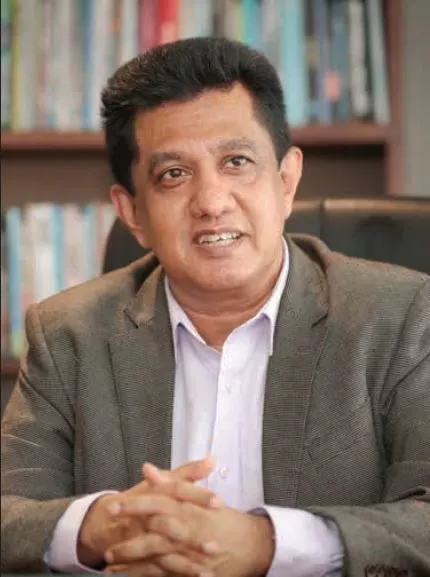
Are these institutions answerable to COPE on the decisions they make or their finances?
Whenever an institution is summoned, its officials have to come before COPE members. There are some institutions, which were never summoned to the COPE for more than five years. Last week we have summoned institutions related with coconut industry, that is, the Sri Lanka Coconut Research Institute, the Coconut Development Authority and the Coconut Cultivation Board. These three institutions were summoned in 2014!
We will be meeting with officials from the Sri Lanka Foreign Employment Bureau and Sri Lanka Cricket soon. We identify the institutions that need to be summoned. Our discussion is based on the report of the Auditor General, who is responsible to the Parliament. The Auditor General’s Department works closely with the main committees in Parliament. The Auditor General himself, together with members of his staff have been meeting with COPE and COPA members and providing us with details pertaining to the status of accounts and finances in public entities. So, our discussion with selected public entities will be based on the report provided by the Auditor General. We have the authority to question officials of these entities on any matter relating to that public enterprise. For instance, the northern highway project was initiated by the Government of 2010-2014, that had planned to build the highway to a certain distance. It shows that amendments for the basic plan were introduced into the project later by different Governments. What COPE is doing right now is to examine the rationale for such changes, because such changes have cost millions of rupees to the country. We will examine whether a feasibility study had been done prior to the change or had it been on an ad hoc decision; whatever the decision, it had cost the country a lot of money, which we are in the process of examining. We are firm on the decision to instruct every chief accounting officer to initiate legal proceedings regarding any irregularities that may have happened with the northern highway project.
But how can you be positive when nothing concrete has really happened in the history of COPE?
It is not true. There were and there are positive outcomes. When I was secretary to the Ministry of Media and Information, I was summoned by Hon DEW Gunasekara, who was the chairperson of COPE to discuss an issue regarding the head of an institution under my ministry purview. The chairperson instructed me to either remove the individual or return after a fortnight to inform the committee of the outcome. In turn, I had to consult with my minister, who agreed to remove the head of that particular institution. We sent his letter of resignation to COPE. So, this was one way to deal with an issue. Hon Sunil Handunetti as COPE chairman dealt with the Central Bank bond scam, which reached a high level of public debate then, which, I think cost the party in power to lose at elections. This was an outcome of what went on in the COPE. At the end of the day, there are many ways that perpetrators can be punished. One would be to defeat a Government or an individual, or file legal charges against an individual or individuals or initiate public consultation on the matter.
What has been your experience working with members of different parties as chairperson of COPE?
I conduct business in a very diplomatic and scholarly manner, hence, have not had an issue with any member of COPE although they are from different parties. We have representatives from the TNA, the JVP and the JHU, and most are represented by senior members, plus there are five ministers who are on the committee. They are all very senior gentlemen. They have all been very supportive and cooperative. We have been examining issues very openly, not with the intention of blaming anyone or pointing fingers. Some people assume that there are differences among COPE members because they are from different political parties, but inside COPE we don’t debate each other; we, as the committee act as a single entity representing Parliament. Inside Parliament we debate on various issues, but, as a sub-committee, we function as a single entity. Every member of COPE, be it from the Government or Opposition, is conscious of their role therein, that is, of safeguarding the money belonging to the public.
Why did you enter politics?
I have been an academic for a long time. We are all products of free education. As an academic, I consider myself fortunate to have been offered a good job with a good salary and minimum work at the university. At senior level, an academic has to teach only six hours per week, and the rest is used to engage in research and consultations. It’s a relaxed and flexible job. But, I strongly believe that Sri Lanka needs to be developed and hence we need to look into the gaps and the lapses in post-independent Sri Lanka. We are now in our 72nd year of independence and countries that were way behind us then are going past us in development. We, as educated individuals have a duty to examine why it has been so and why things have been happening in a certain way that has not allowed us to evolve and develop. For instance, our GDP and growth related indexes were quite high at independence, so much so, we were very close to Japan’s growth indexes, while some countries were way behind us; there were countries that had not been even born. The growth rate in Bangladesh is eight percent and the country is currently on a growth trajectory. There was no Bangladesh when Sri Lanka gained independence in 1948. In 1948, India had just been divided to create Pakistan; subsequently Pakistan was divided as East and West Pakistan. Bangladesh, which was created as an independent country in 1972, has been developing at an impressive rate. As an academic I wondered, apart from the academic related work I engage in, whether I could contribute in a different way to help develop Sri Lanka. As an academic I have been developing concepts, then as chairperson of the Central Environmental Authority and secretary to the Ministry of Media and Information I served in an implementation (administrative) space. Between the conceptual space and the implementation space there’s something called the policy space. Policy is about creating legislation, which is essentially the purview of Parliament. My argument is that despite our effective engagement in the conceptual and administrative spheres, the country will always fail if we do not act sufficiently in the policy space. As academics we may be able to generate good concepts to teach students and be good implementers in administrative positions, but we need to engage in the policy space for the sake of our country. A majority seem to be engaged in the first and the third, the second lacking in proper engagement. Therefore, I decided that I will enter this space. So, here I am. I hope I will be able to make a worthy contribution through policy.
Can you tell us something about yourself?
I hail from a very rural village in Kuliyapitiya in Kurunegala District. My family, relations and friends still live in Kuliyapitiya. I obtained by BA degree in Philosophy with a minor in Psychology from the University of Peradeniya in 1994 and Master of Arts (MA) degree in Social and Political Philosophy from Ohio University, Athens, Ohio in USA in 2003. In 1998, I completed a Master’s Diploma at the Sichuan Union University, Chengdu in China. I received my Doctoral Degree (PhD) on Environmental Philosophy from the University of Kelaniya, Sri Lanka. The topic of my Doctoral thesis was ‘A Philosophical Analysis on the Concept of Conservation in the field of Environmental Ethics – The Case of Environmental Impact Assessments in Sri Lanka’.
I was teaching at the University of Peradeniya from 1995 to 2019 in an official capacity, while I was on secondment in Government jobs inbetween. In 2019, I was appointed as the chair professor of philosophy at my department at the University of Peradeniya, a position that had been vacant for more than 20 years, and then in 2019 I entered politics. I have published widely on research and as an academic, I have been participating in debates on policy and politics in mainstream media. My engagement with the media is mainly focused on environment. I was fortunate to have been on the CHOGM subcommittee in 2013, which was a very successful event after the non-aligned summit in 1976. Basil Rajapaksa was an immense support in this endeavor and the work of the various committees preparing for CHOGM. I have also served in various regulatory bodies, in environment and the media. I was very engaged with the public sector during 2005 to 2015, which makes me more a public intellectual, implementer and policymaker. My current engagement with COPE is based on my enthusiasm for policymaking. Having defeated terrorism in 2009, the country embarked on multi-level development projects, which happened up to 2015, until we were defeated. When we examined the reasons for the defeat, we realized that it was not about the policies or the plans, but the lack of commitment and failure to be result-oriented by some of the people involved, although there was political leadership to succeed. We are fortunate to have Mahinda Rajapaksa as a pillar of this entire exercise and I realized that this was my time to deliver at a policy level. In the meantime, new President, Gotabaya Rajapaksa has a great deal of enthusiasm and vision and Basil Rajapaksa has been the driving force for people like me to enter politics. Our party had been working for the past five years to regain power and I knew it would happen and hence, realized that the time was ripe for me to enter politics and be a policymaking Parliamentarian. I was planning to contest from the Kurunegala district, but since there was a long list of candidates from our party, along with many others expecting slots, I was not able to contest and hence, the party along with Basil Rajapaksa suggested that I enter Parliament from the national list. Today, I’m quite involved with the Kurunegala district and am the chairperson of the Regional Development Council of the Polgahawela electorate, an area that has been the focus of my work. that this was my time to deliver at a policy level. In the meantime, new President, Gotabaya Rajapaksa has a great deal of enthusiasm and vision and Basil Rajapaksa has been the driving force for people like me to enter politics.
What is the way forward?
Sri Lanka should change towards becoming a modern and productive nation. We can do that because we have a very good system of education, healthcare and security. The President has laid down three concepts in the Saubhagyaye Dekma policy statement to change the country; first, Development, where the focus has been on developing the export sectors, second is Security, which is in place, third is Reforms. Many regulations in this country prevent people from investing, especially foreigners. Our target is to change the way the country has been operating so far, by applying the three layers – development, security and reform. I think the pandemic has somewhat blocked the progress and the plans, but I believe that we will be able to achieve our targets in the next four years. We need to rethink policy and policy engagement. I have been trying to convert my thinking, capacity and ability into policymaking processes and invest time on regional development, reforms and the tasks of COPE.



